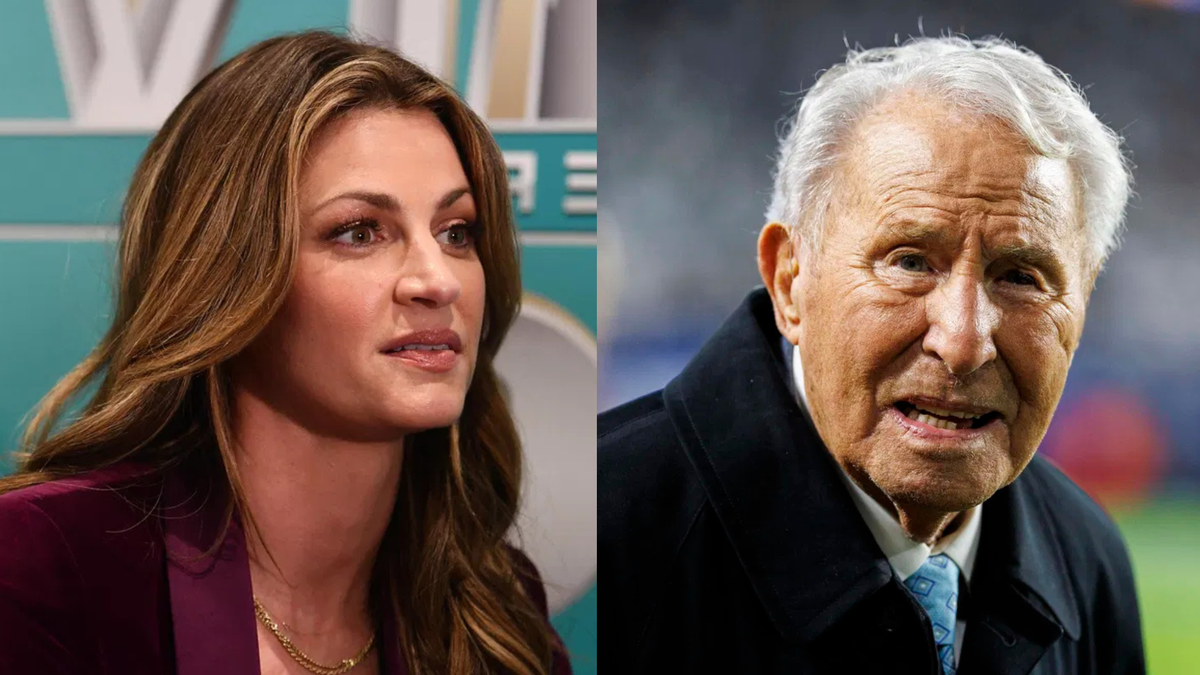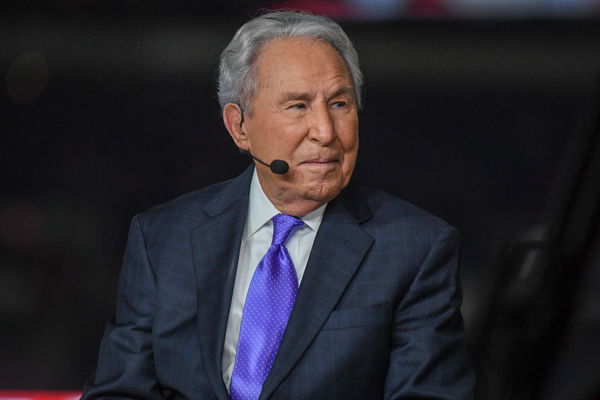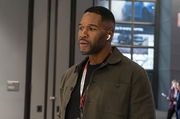
Imago
Credits: Imago

Imago
Credits: Imago
Lee Corso’s career doesn’t fit neatly into a single frame. He’s been a quarterback, a coach, a pioneer, and eventually the showman who turned Saturday mornings into something closer to theater than just football analysis. For nearly four decades on College GameDay, he was the heartbeat of the sport’s pregame ritual. Unpredictable, joyous, and utterly original. And as Corso steps away at 90 years old, the tributes have poured in, including from one of his former colleagues who’s now one of the most prominent voices in the game. Erin Andrews!
Watch What’s Trending Now!
On Friday, August 30, Andrews shared a throwback image from the GameDay desk in her IG story, surrounded by cheerleaders and colleagues, writing across the top. “In honor of the best Saturday of the year… What a legend you are Coach Corso!” It wasn’t long or overly sentimental, it didn’t need to be. The timing, the photo, and those simple words captured everything. The magic of college football Saturdays and the central role Corso has played in making them feel so special. Sometimes the best way to honor a figure like Corso is to keep it short and let the legacy speak for itself.
Corso’s impact on College GameDay can’t really be overstated. When the show launched in 1987, it was a modest studio broadcast. By the time it exploded into a traveling circus of signs, mascots, and packed quads in the late ’90s, Corso was the face of it. His energy set the tone, his one-liners loosened the format, and his headgear picks became the exclamation point on every Saturday morning. He didn’t just adapt to the show’s growth, he drove it.
ADVERTISEMENT

Imago
Lee Corso ESPN analyst Lee Corso before the College Football National Championship game between Alabama Crimson Tide and Georgia Bulldogs, Monday, Jan. 10, 2022, in Indianapolis, IN. Dylan Stewart/Image of Indianapolis Indiana United States EDITORIAL USE ONLY Copyright: xAP2022x NYWWP DylanxStewartx iosphotos263159
The headgear, of course, became his signature. From Brutus to Bevo, from Aubie to the Duck, Corso’s tradition of capping the broadcast with a mascot’s head turned into one of the most anticipated moments in sports television. It was part comedy, part drama, part pageantry, the kind of unpredictable theater that live sports thrive on. And behind the theatrics, he understood something deeper: college football is about joy and identity, and nothing captured that better than watching a legend pull on a giant mascot head in front of a roaring student section.
But Corso’s career stretched well beyond the stage. Before ESPN, he was a longtime college coach, most notably at Louisville and Indiana, where his teams carved out competitive runs. He even led Indiana to its first-ever bowl win in 1979.
ADVERTISEMENT
Add in his decades as a broadcaster, his resilience after suffering a stroke in 2009, and his enduring role as a beloved ambassador for the sport, and you get the full picture of a man whose story is woven into the DNA of college football. Few have done more to shape how fans experience Saturdays.
ADVERTISEMENT
Erin Andrews struggled heavily at ESPN in her starting years
She makes it look effortless now, the polished delivery, the commanding sideline presence, the voice of authority on the biggest stage in football. But rewind the tape, and Erin Andrews’ rise at ESPN looked nothing like the finished product we see today. Behind the camera lights was a woman running herself ragged, convinced she was never enough. Andrews has since admitted what most never saw. She was drowning.
“I worked my a– off, and it was never enough,” she revealed, peeling back the curtain on her early years. Two football games a week. College basketball. Major League Baseball. The Little League World Series. Even the Scripps Spelling Bee. She said yes to everything, lived on planes, memorized scouting reports until her eyes blurred. And still felt like she was falling short. It was the mid-2000s. No Instagram, no Twitter to hype her hustle or defend her missteps.
Top Stories
Bills Officially Cut Ties With 4 Players as Josh Allen Remain Without HC After Philip Rivers Quits

ICE to Conduct Immigration Enforcement at Patriots vs. Seahawks Super Bowl LX at Levi’s Stadium, as Per Official

Travis Kelce Makes Major Career Decision as Chiefs TE Contemplates Retirement

Strahan Family in Mourning as Michael Strahan’s Cancer-Free Daughter Grieves Close Friend’s Loss After Cancer Battle

Jerry Jones’ Cowboys Make Triple Firing Decision After Blocking Coach’s Exit

Just silence, pressure, and the fear that every mistake would confirm the whispers. She’s only here because of how she looks. Erin Andrews remembers the outfits, the long nights, the overwhelming doubt and she laughs now. But back then? It was survival. “That is so friggin’ hard,” she admitted, still carrying the scar tissue of that grind. What no one knew was that she was preparing like her career depended on it.
ADVERTISEMENT
Because in her mind, it did. She buried herself in research, often studying three times more material than she’d ever use on-air. Why? To erase the possibility of being caught off guard. To silence that voice inside and those outside, ready to question if she really belonged. And the cruel twist? That neurotic edge became her weapon. Every sleepless night, every binder of unused notes, every private breakdown forged the on-air composure fans see today. Erin Andrews didn’t just “make it.”
She clawed her way into credibility by refusing to break, even when the job nearly broke her. Now, with FOX and the NFL spotlight, she stands as one of the most trusted voices in sports. But her secret legacy isn’t the Super Bowls she’s covered. It’s that quiet war she fought in her ESPN years. The one where she learned the hardest lesson in sports media: the world may never think you’re enough, but if you outlast the doubt, eventually, your voice becomes undeniable.
ADVERTISEMENT
ADVERTISEMENT
ADVERTISEMENT



